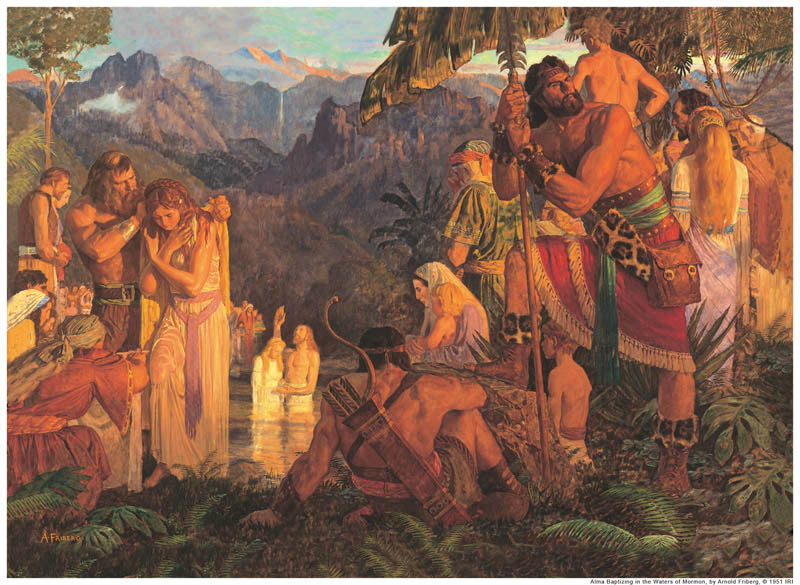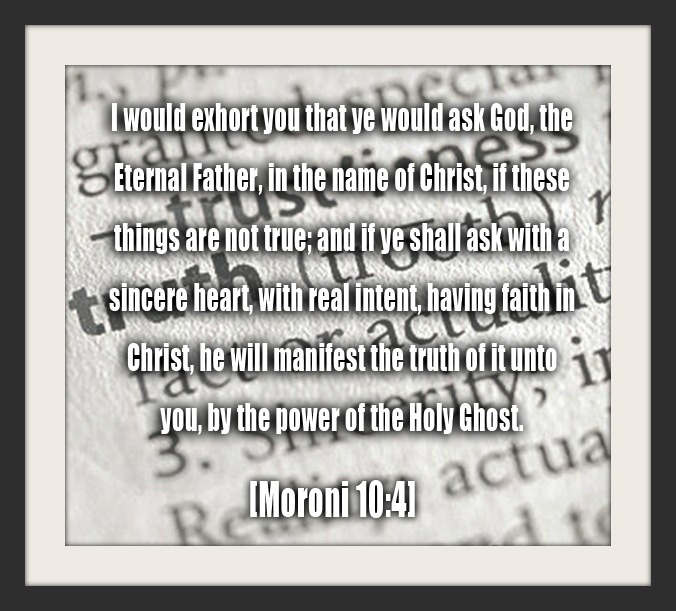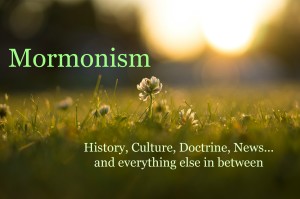 In the Book of Mormon, a missionary named Alma went with others to preach to a group of people called the Zoramites. This was an apostate group that had formed around a leader named Zoram. Alma and his missionary companions were shocked by what they saw when they visited the “worship” service of these people. They’d never seen anything like it and they felt sick at what they observed.
In the Book of Mormon, a missionary named Alma went with others to preach to a group of people called the Zoramites. This was an apostate group that had formed around a leader named Zoram. Alma and his missionary companions were shocked by what they saw when they visited the “worship” service of these people. They’d never seen anything like it and they felt sick at what they observed.
The people had built a synagogue, used only one day a week for their official service. In this synagogue, they had built a tall platform. They took turns climbing up onto it, putting them above the others, and there they recited a prayer. Each person gave the exact same prayer. This was the prayer they offered:
15 Holy, holy God; we believe that thou art God, and we believe that thou art holy, and that thou wast a spirit, and that thou art a spirit, and that thou wilt be a spirit forever.
16 Holy God, we believe that thou hast separated us from our brethren; and we do not believe in the tradition of our brethren, which was handed down to them by the childishness of their fathers; but we believe that thou hast elected us to be thy holy children; and also thou hast made it known unto us that there shall be no Christ.
17 But thou art the same yesterday, today, and forever; and thou hast elected us that we shall be saved, whilst all around us are elected to be cast by thy wrath down to hell; for the which holiness, O God, we thank thee; and we also thank thee that thou hast elected us, that we may not be led away after the foolish traditions of our brethren, which doth bind them down to a belief of Christ, which doth lead their hearts to wander far from thee, our God.
18 And again we thank thee, O God, that we are a chosen and a holy people. Amen. (See Alma 31.)
The prayer, in short, was nothing short of a bragging session. These people believed in predestination, that they had been chosen for exaltation from the beginning and that only they could be exalted. No one else had any hope of achieving God’s grace. They felt they were better than everyone else and “holy children.” In addition, they did not believe in Jesus Christ, who had not yet been born.
Once they’d finished this arrogant task, they went home and did not pray or worship again, or even mention God, until the next Sabbath day. They felt no special obligation to God in any way and did not feel anything else was required of them other than to show up once a week to brag about how special they were. Alma noted that they came dressed up in expensive, elegant clothing and fancy jewelry, probably befitting, in their minds, their special status in the world.
Certainly their wealth was a factor in deciding who was predestined to be saved. Those who were not wealthy and didn’t have expensive clothing or lifestyles were not allowed to enter the Zoramite temples.
1 And it came to pass that they did go forth, and began to preach the word of God unto the people, entering into their synagogues, and into their houses; yea, and even they did preach the word in their streets.
2 And it came to pass that after much labor among them, they began to have success among the poor class of people; for behold, they were cast out of the synagogues because of the coarseness of their apparel—
3 Therefore they were not permitted to enter into their synagogues to worship God, being esteemed as filthiness; therefore they were poor; yea, they were esteemed by their brethren as dross; therefore they were poor as to things of the world; and also they were poor in heart.
4 Now, as Alma was teaching and speaking unto the people upon the hill Onidah, there came a great multitude unto him, who were those of whom we have been speaking, of whom were poor in heart, because of their poverty as to the things of the world.
5 And they came unto Alma; and the one who was the foremost among them said unto him: Behold, what shall these my brethren do, for they are despised of all men because of their poverty, yea, and more especially by our priests; for they have cast us out of our synagogues which we have labored abundantly to build with our own hands; and they have cast us out because of our exceeding poverty; and we have no place to worship our God; and behold, what shall we do? (See Alma 32)
Alma was thrilled when he heard these words. He saw that they, though their lives had been terrible, had been humbled by their trials. They longed to worship God in the synagogues, which they had helped to build but were not allowed to enter. They were excluded because the Zoramites falsely believed that poverty was a sign of unworthiness.
Alma then turned his attention to the poor in this community, deciding not to waste his time on those who lacked the humility and love to accept the message of Jesus Christ, especially since they didn’t believe in him. In the next article, we’ll learn what Alma taught them.
The Zoramites made several mistakes in their choices of worship. They presumed, first of all, that their mere presence and a single ritual was all that was required of them. The rest of the week, God was out of their minds and hearts.
Their service offered nothing personal. Each one recited a single prayer and the prayer was not about God. It was really only about their own glory and superiority.
In other words, there was nothing worshipful about the method of worship they had chosen. Contrast their meetings with this description of a Mormon Sacrament Meeting, which is the basic worship service held each Sunday: “Each member of the Church bears responsibility for the spiritual enrichment that can come from a sacrament meeting. Each should sing with a grateful heart and respond with an audible “amen” at the conclusion of a prayer or a testimony. We personally ponder the Atonement of Jesus Christ. We reflect upon the significance of His suffering at Gethsemane and His Crucifixion on Calvary. At this time, each of us is to “examine himself” (1 Cor. 11:28) and reflect upon personal covenants made with the Lord. At this time, we meditate upon the sacred things of God (Russell M. Nelson, “Worshiping at Sacrament Meeting,” Ensign, Aug 2004, 24–28).
Worship is internal, but it is influenced during services by the things going on around us. Merely reciting pre-rewritten words as the entire service can lead to meaningless repetition. A worship service is meant to help us learn more about God and Jesus Christ and to increase our commitment to living a life of loving service. It is a time to worship God, not ourselves. It can be a humbling experience, not one in which we announce we are better than everyone else, particularly when the measuring stick is a worldly and meaningless one.
The Zoramites felt they had met their duty to God simply by showing up and saying their script. During the week, they neglected God. As we study the Bible and the words of Christ, we come to understand that religion should be something that fills every part of our day. Even when we’re at work or doing mundane chores, we should have the Savior in our minds and hearts and be focused on worshipping Him and measuring our thoughts and actions against the way He taught us to live.
The A to Z index on LDS.org says: To worship God is to give Him our love, reverence, service, and devotion. The Lord commanded Moses, “Worship God, for him only shalt thou serve” (Moses 1:15). He has also commanded, “Thou shalt love the Lord thy God with all thy heart, with all thy might, mind, and strength; and in the name of Jesus Christ thou shalt serve him” (D&C 59:5). Worship not only shows our love for God and commitment to Him, it gives us strength to keep His commandments. Through worship we grow in knowledge and faithfulness. If we place any person or thing above the love of God, we worship that thing or person. This is called idolatry (see Exodus 20:3–6). (See Worship.)
We can see there was nothing of worship in the doings of the Zoramites. Today, although we might not be so blatant about it, many people show up for church eager for others to see their elegant clothing (while God only asks that we wear the best we have, which has nothing to do with the cost of it) or to socialize with others. We get out of our worship service exactly what we put into it.
When you attend church this week, will you just be fulfilling an obligation or will you be worshipping God? And the rest of the week?
About Terrie Lynn Bittner
The late Terrie Lynn Bittner—beloved wife, mother, grandmother, and friend—was the author of two homeschooling books and numerous articles, including several that appeared in Latter-day Saint magazines. She became a member of the Church at the age of 17 and began sharing her faith online in 1992.





